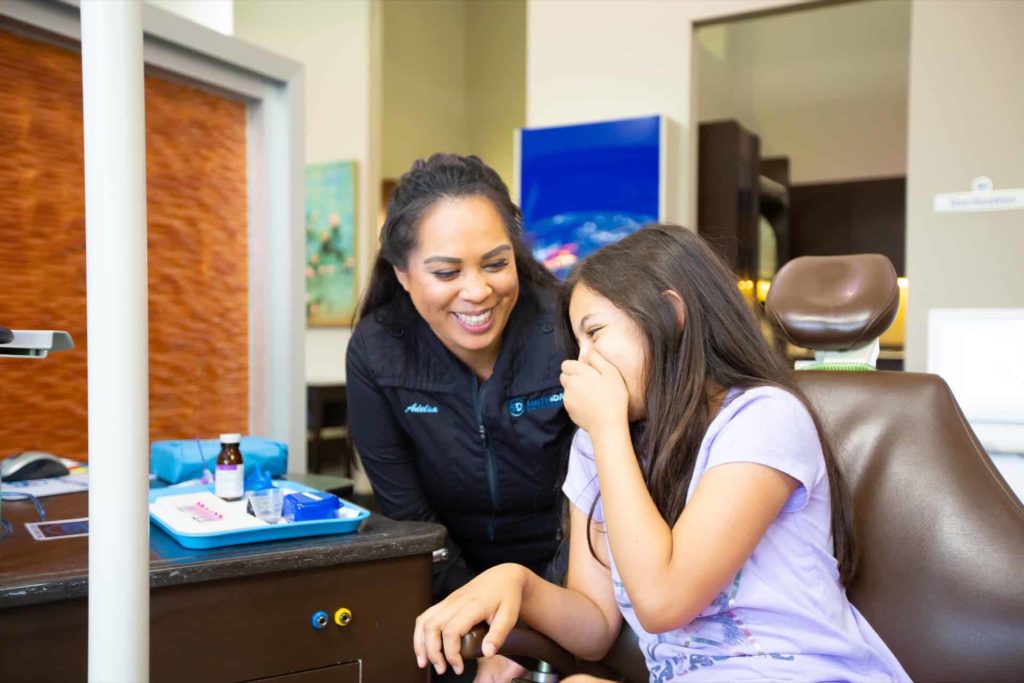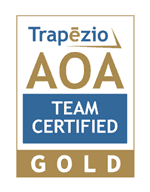Brushing can be more of a challenge with braces. How do you brush and floss your teeth around all those brackets and wires? Brushing while wearing braces can be a lot easier if you have the best toothbrush for braces.
Smith and Davis Orthodontics wants you to have the best results possible from your braces treatment. We’ll do our part, but it also means you have to do your part to keep your teeth clean by brushing and flossing daily.
We’ll help you out by offering tips on the best way to keep your teeth and gums clean. What’s the best toothbrush for braces? How often should you brush your teeth? What problems does bad brushing with braces cause? We have the answers!

Brushing and flossing daily is vital to good oral health. Brushing and flossing remove bacteria and plaque that can weaken your tooth enamel — the hard outer shell that protects the living interior of your teeth. It also removes plaque and prevents tartar (hardened plaque) buildup around your gums, which can lead to gum disease.
Once you get braces, it may seem that brushing and flossing will be harder. While it may be a little more complicated, it’s not really more difficult, especially if you use the right tools. The right toothbrush and flossing tools can make brushing and flossing much easier.
What Is the Best Toothbrush for Braces?
You may think a toothbrush is just a toothbrush, but that’s not the case. The right toothbrush will give you better oral hygiene while protecting your teeth, gums, and braces.
Which toothbrush is best with braces? Are an electric toothbrush and braces a good combination? Is a manual toothbrush better with braces?
The most important thing is to brush your teeth; either type of toothbrush will work. However, we do recommend an electric toothbrush for braces.
Here are some tips for choosing the right toothbrush for braces.
- Use a soft-bristled toothbrush
- Get a toothbrush with a small, angled head for better reach, particularly to the back teeth
- Use a toothbrush with colored bristles that fade to tell you when to change the toothbrush
- Change out the toothbrush or toothbrush head every three months to maintain effectiveness
The Toothbrush Recommended for Braces
Is an electronic toothbrush safe for braces? Definitely, and it’s recommended! Why is the electric toothbrush the toothbrush recommended for braces? It has several advantages over manual toothbrushes.
- Rotating bristles clean around braces brackets and wires more easily
- Vibration movement dislodges food particles around brackets
- Colored bristles fade to let you know when to change the toothbrush head
- Some electronic toothbrushes have compatible heads with bristles specially made for orthodontics
- Electric toothbrushes offer more scrubbing power without damaging your enamel or gums
How to Brush With Braces
Whichever brush you use, you should brush your teeth with fluoride toothpaste, holding the toothbrush at a 45-degree angle to get around the brackets and over all tooth surfaces and along the gum line.
Don’t brush too hard — you could irritate your gums, which may already be sensitive from the movement of your teeth.

Flossing With Braces
“Should I floss after every meal?” It’s a question we get often. Here are our best suggestions on flossing with braces.
You need to floss at least once a day. Some say flossing in the morning is better, while others suggest just before bed is the best time. Whichever you choose, just make sure you floss thoroughly with dental floss.
Water flossers are good to use at other times of the day, but they lack the scrubbing power of dental floss, so they should be used as a supplement and not a substitute.
Use Floss Threaders With Braces
Flossing with braces could be a real challenge because wires are in the way! How are you going to thread that floss through those wires to clean between your teeth?
Floss threaders come in two options. One type of floss threader looks like a giant, thin needle that will slide between your teeth and under the wires. You thread the dental floss through the giant eye of the floss threader and slide it between your teeth.
The other option is a string of floss with a thin piece of plastic attached to one end. This serves as the floss threader and allows you to pull the dental floss through your teeth. Each piece of floss is pre-cut, so you don’t have to worry about using too little or too much.
Water Flossers With Braces
Water flossers can also help. They can remove food particles and plaque from around your brackets, under your wires, and between your teeth. However, they don’t have the scrubbing power of dental floss, so they should be used as a supplement to dental floss, not a replacement.

What Happens With Bad Brushing With Braces?
What happens if there is poor brushing with braces? Bad brushing with braces could end up with white spots around your brackets that will be visible once those braces come off. That’s because plaque buildup around the brackets can demineralize the enamel, leaving white spots behind.
You also don’t want to delay your treatment, but that could happen if you get a cavity. Depending on the location, we may have to remove part of your braces so the dentist can repair the tooth. This could delay treatment.
It’s important to keep your teeth clean during treatment so you end up with clean, healthy teeth once your braces are removed. It’s also important to watch what you eat. High-sugar foods such as candy, soft drinks, and desserts can add plaque and bacteria.
How often should you brush your teeth? Brush at least twice a day — morning and night. It’s fine if you can brush after lunch, but you can rinse your mouth with water if you can’t. How often you brush teeth and braces can mean the difference between a perfect smile and a not-so-perfect smile.

Better Brushing With Braces in Rogers, AR
Brushing with braces doesn’t have to be a challenge. Using a good toothbrush for braces can make the task much easier. The key is to brush at least twice a day every day and floss at least once daily.
Come to us if you have other problems brushing or flossing with braces. We’re happy to help! Schedule an appointment with Smith and Davis Orthodontics in Rogers, AR, if you’re ready for orthodontic treatment and advice on better brushing with braces!






